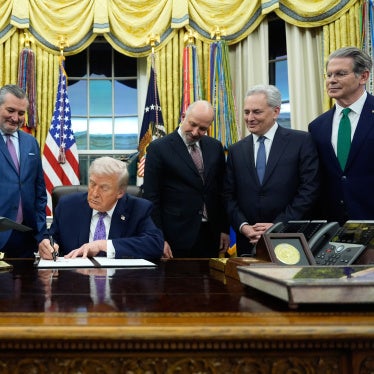The United Kingdom’s surveillance regulations are obscure, incomprehensible, unnecessary, and “undemocratic.” Not the assessment of some wild-eyed radical, but the careful conclusion of David Anderson QC, the UK’s independent reviewer of terrorism legislation, in his report published yesterday.
Anderson was tasked by the government to review the UK’s surveillance laws, including on issues of privacy, transparency, and oversight. His report makes for sobering reading.
One of the most important of the report’s many recommendations is that warrants to intercept communications should always be subject to the safeguard of judicial authorization, instead of the current system in which such warrants are issued by government ministers. Responding to the new report in a Parliamentary debate, Home Secretary Theresa May did not commit to such a change, though she said she would look into it.
Since Edward Snowden’s revelations about the UK’s involvement in mass surveillance almost two years ago, the UK authorities have failed to engage in an open debate about their practices and policies. Ignoring calls from civil society to bring British laws in line with international law, the previous coalition government rushed through so-called emergency legislation to increase those powers by extending the scope of interception warrants to companies outside the UK, and has already announced a new law that would expand them even further – potentially reviving a version of the 2012 Communications Data Bill (aka the “Snooper’s Charter”).
May has announced that the government will publish a draft surveillance bill after the summer that would lead to new legislation by the end of 2016. The recently elected UK government now has a choice: it can either continue to expand the already extensive powers of the intelligence agencies and disregard of millions of people’s right to privacy. Or it can start complying with its international human rights obligations and bring forward a law that only allows surveillance that is necessary, proportionate, and that serves a legitimate purpose.
The Anderson report makes clear that tinkering at the margins of a deeply flawed system is not enough: instead, a “comprehensive and comprehensible new law should be drafted from scratch” that provides clear limits and safeguards on intrusive surveillance powers. He elaborates that the government has not yet made a “compelling operational case” for expanding surveillance powers as outlined in the 2012 Communications Data Bill, and that such proposals should not be taken forward without public consultation and a rigorous assessment of their “lawfulness, likely effectiveness, intrusiveness and cost.”
The new surveillance law should introduce a system of judicial authorizations of all interception warrants, as recommended by Anderson. But it should go further than his recommendations. It should also end bulk data collection, which is, by nature, disproportionate. The United States has started to reform its own surveillance laws and practices, including by ending bulk, nationwide collection of communications metadata and introducing new transparency measures to enable better oversight. It’s time for the UK to catch up.








